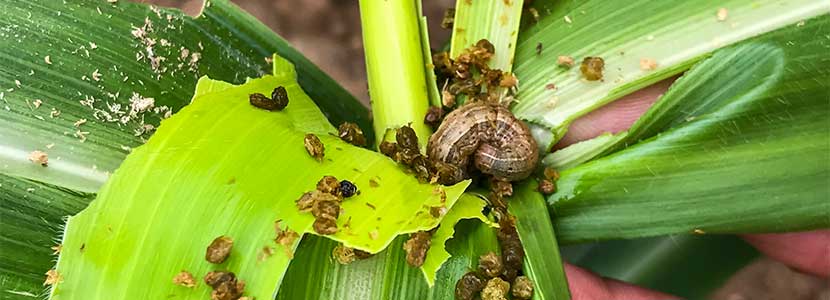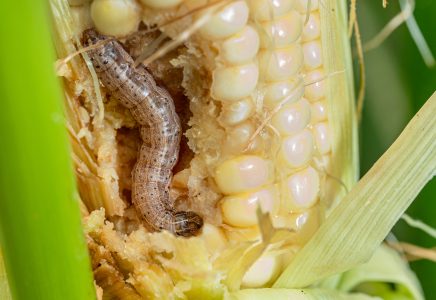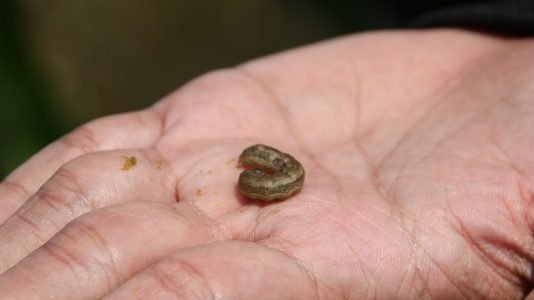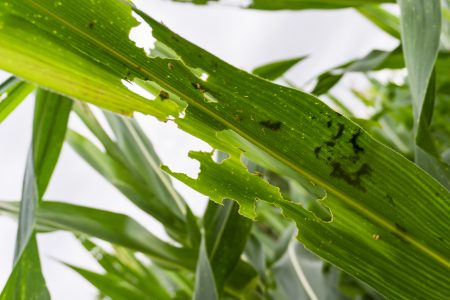New Global Action
 29 Apr 2022
29 Apr 2022
Fall armyworm (FAW), Spodoptera frugiperda, is a moth native to tropical and subtropical regions of the Americas that has spread throughout the world. It can cause significant damage to plants during its larval phase, unless there are: some type of natural control, and the implementation of good agronomic practices or resistant varieties. The fall army worm has a preference for corn crops but can also affect other crops such as:

| Once established in a country, it is almost impossible to eradicate or control FAW in order to prevent it from spreading. This is due to the fact that an adult can fly up to a hundred kilometers in a single night making it very difficult to control. |

Since its arrival in West Africa in early 2016, the fall armyworm (FAW) has spread to almost all African countries. It has also spread to the Middle East and more than a dozen Asian countries, including China, India and Japan. Its presence has also been reported in Australia, Mauritania and East Timor.
Europe’s southern regions are at high risk of following such trend.
Based on estimates from 12 African countries carried out during 2018, up to 17.7 million tons of corn a year could be lost due to FAW on that continent. This would be enough to feed tens of millions of people. The most direct impact of such losses affects small corn farmers, who most times depend solely on this crop to avoid hunger and poverty.
New Global Action
FAO has developed a new three-year Global Action plan for Autumn Worm Control. Ensuring a robust and coordinated approach at national, regional and global levels. FAO’s new global initiative aims to mobilize US$10 million in 2020-22 to take radical, direct and coordinated actions that can strengthen sustainable pest prevention and control capacity globally.
This Global Action is massively expanding FAO’s efforts against FAW thanks to the presence multiple mechanisms such as: farmer field schools, partnerships with research institutions, private sector alliances, South-South cooperation, regional and national plant protection organizations and finally the presence of national groups working specifically on FAW.

Three key objectives:
Global Action is being implemented in a coordinated and harmonic manner in these three regions: Africa, Middle East and Asia-Pacific. Interventions target priority countries identified through FAO’s new Hand-in-Hand Initiative.
This initiative looks to level the world’s most developed countries with those that present the highest poverty and hunger rates. Striving to support and achieve the UN Sustainable Development Goals.

The Global Action for FAW Control reinforces efforts to discourage widespread use of highly hazardous chemical pesticides, placing greater emphasis on prevention. It advocates for a combination of good surveillance and early warning systems, with integrated pest management as a basis to support farmers with their respective management practices.
![]() Global Action has established a global coordination mechanism for open and collaborative dialogue towards simple solutions. It also supports the creation and expansion of national FAW related work groups, and resource destination towards applied research looking for practical and efficient solutions.
Global Action has established a global coordination mechanism for open and collaborative dialogue towards simple solutions. It also supports the creation and expansion of national FAW related work groups, and resource destination towards applied research looking for practical and efficient solutions.
In the past three years, FAO has already spearheaded 63 FAW-related projects, mainly in Africa. Establishing plenty good of practices and accumulating very valuable knowledge along the way.
FAW Control Program Success
With the discovery of potential losses due to this pest in 2019, FAO launched a Global Action to Combat autumn Worm (FAW).

This involved a coordinated approach implemented across Africa, the Middle East and Asia in order to control this pest at global, national, regional and local levels.
![]() In eight areas → the application of an integrated pest management (IPM) approach has been very successful. In addition to this, pest-resistant corn varieties are already available and are currently being tested in Africa.
In eight areas → the application of an integrated pest management (IPM) approach has been very successful. In addition to this, pest-resistant corn varieties are already available and are currently being tested in Africa.
![]() Finally, more than 140 000 farmers, extension workers and other professionals have benefited from training on problem control methods.
Finally, more than 140 000 farmers, extension workers and other professionals have benefited from training on problem control methods.
In the last two years, crop losses due to FAW in the west African state have remained below 5%. This is attributed to a certain extent to the introduction of biological controls. These have proven to be close to 90% effective when used in the field. Which in turn has generated positive expectations regarding this type of sustainable pest management practices.
Source: FAO. Global Action for Fall Armyworm Control 2022
Subscribe now to the technical magazine of animal nutrition
AUTHORS

Nutritional Interventions to Improve Fertility in Male Broiler Breeders
Edgar Oviedo
The Use of Organic Acids in Poultry: A Natural Path to Health and Productivity
M. Naeem
Synergistic Benefits of Prebiotics and Probiotics in Poultry, Swine, and Cattle
Gustavo Adolfo Quintana-Ospina
Hybrid Rye Potential in Laying Hen Feed Rations
Gwendolyn Jones
A day in the life of phosphorus in pigs: Part I
Rafael Duran Giménez-Rico
Use of enzymes in diets for ruminants
Braulio de la Calle Campos
Minerals and Hoof Health in the Pregnant Sow
Juan Gabriel Espino
Impact of Oxidized Fats on Swine Reproduction and Offspring
Maria Alejandra Perez Alvarado